 This is a guest posting (written at the invitation of Gavin Baker) for the new blog
This is a guest posting (written at the invitation of Gavin Baker) for the new blog
"
Open Students: Students for Open Access to Research."
Other OA activists are also encouraged to contribute to the Open Students blog.
SUMMARY: Open Access (OA) will not come until universities, the research-providers, make it part of their mandate not only to publish their research findings, as now, but also to see to it that the few extra keystrokes it takes to make those published findings OA -- by self-archiving them in their institutional repositories, free for all online -- are done too. Students are in a position to help convince their universities to go ahead and mandate OA self-archiving, at long last.
My guess is that Open Access (OA) already sounds old hat to the current generation of students, and that you are
puzzled more about why we are still talking about OA happening in the future, rather than in the distant past (as the 80's and 90's must appear to you!).
Well, you're right to be both puzzled and impatient, but let me try to explain why it's been taking so long. (I say "try" because I have to admit that I too am still somewhat
perplexed by the slowness of OA growth, even after sampling the sluggishness of its pace for
nearly 2 decades now!) And then I'll try to suggest what you students can do to help speed OA on its way to its obvious, optimal, and long overdue
destination.
What OA Is Not
First, what is Open Access (OA)? It's not about
Open Source (OS) software -- i.e., it's not about making computer programs either open or free (though of course OA is in favor of and compatible with OS).
It's not about
Creative Commons (CC) Licensing either -- i.e., it is not about making all digital creations re-usable and re-publishable (though again OA is in favor of and compatible with CC licensing).
Nor is it about "freedom of information" or "freedom of digital information" in general. (That's much too broad and vague: OA has a very specific kind of information as its target.)
And, I regret to say, OA is not about helping you get or share free access to commercial audio or video products, whether analog or digital: OA is completely neutral about that. OA's target is only
author give-aways, not "
consumer sharing" (though of course free user access webwide will be the outcome, for OA's special target content).
What Is OA's Target Content?
So let's start by being very explicit about OA's target content: It is the 2.5 million articles a year that are published in the planet's
25,000 peer-reviewed scholarly and scientific journals.
Eventually OA might also extend to some scientific and scholarly
books (the ones that authors want to give away) and also to scholarly scientific
data (if and when the researchers that collected them are ready to give them away); it may also extend to some software, some audio and some video.
But the only content to which OA applies without a single exception today is peer-reviewed journal articles. They are the works that their authors always wrote just so they should be
read, used, applied, cited and built upon (mostly by their fellow researchers, worldwide). This is called "
research impact". They were never written in order to earn their authors
income from their sale.
These special authors -- researchers -- never sought or received any revenue from the sale of their journal articles. Indeed, the fact that there was a price-tag attached to accessing their articles (a price-tag usually paid through institutional library subscriptions) meant that these researcher-authors, and research itself, were losing research impact, because subscriptions to these journals were expensive, and most institutions could only afford access to a small
fraction of them.
What Is OA?
To try to compensate for these access barriers in the old days of paper, these special give-away authors would provide supplementary access, by mailing free individual reprints of their articles, at their own expense, to any would-be user who had written to request a reprint. You can imagine, though, how slow, expensive and inefficient it must have been to have to supplement access in this way, in light of what the web has since made possible: First, the possibility of emailing eprints was an improvement, but the obvious and optimal solution was to put the eprint on the web directly, so any would-be user, webwide, could instantly access it directly, at any time.
And that, dear students, is the essence of OA:
free, immediate, permanent, webwide access to peer-reviewed research journal articles: give-away content -- written purely for usage and impact, not for sales revenue -- finding, at last, the medium in which it can be given away, free for all, globally, big-time.
OA = Gold OA or Green OA
You thought OA was something else? Another form of publishing, maybe? with the author-institution paying to publish the article rather than the user-institution paying to access it? That is
OA journal publishing. But OA itself just means: free online access to the article itself.
There are clearly
two ways an author can provide free online access to an article: One is by publishing it in an OA journal (this is called the "golden road" to OA, or simply "
Gold OA") and the other is by publishing it in a conventional subscription journal, but also
self-archiving a supplementary version, free for all, on the web (this is called the "green road" to OA, or simply "
Green OA").
OA ≠ Gold OA Only (or even Primarily)
Gold OA publishing is probably what peer-reviewed journal publishing will
eventually settle on. But for now, only about
3000 of the
25,000 journals are Gold OA, and the majority of the most important journals are not among that 3000.
Moreover, most of the potential institutional money for paying for Gold OA is currently still tied up in each university's ongoing subscriptions to non-OA journals. So if Gold OA is to be paid for today, extra money needs to be found to pay for it (most likely out of already insufficient research funds).
Yet what is urgently needed by research and researchers today is not more money to pay for Gold OA, nor a conversion to Gold OA publishing, but
OA itself.
And 100% OA can already be provided by authors -- through Green OA self-archiving -- virtually overnight.
It has therefore been a big mistake -- and is still one of the big obstacles slowing progress toward OA -- to imagine that OA means only, or primarily, Gold OA publishing. (This mistake will keep getting made,
repeatedly, in the Open Student blog too -- mark my words!)
The "Subversive Proposal"
It was in 1994 that the explicit "
subversive proposal" was first made that if a supplementary copy of each peer-reviewed journal article were self-archived online by its author, free for all, as soon as it was published (as some authors in
computer science and
physics had already been doing for years), then we could have (what we would now call) 100% (Green) OA virtually overnight.
But that magic night hasn't arrived -- not then, in 1994, not in the ensuing decade and a half, and not yet today. Why not?
"Zeno's Paralysis"
There are at least
34 reasons why it has not yet happened, all of them psychological, and all of them groundless. The syndrome even has a name: "
Zeno's Paralysis":
"I worry about self-archiving my article because it would violate copyright... or because it would bypass peer review... or because it would destroy journals... or because the online medium is not reliable... or because I have no time to self-archive..."
Meanwhile,
evidence (demonstrating the obvious) was growing that making your article OA greatly increases its usage and impact:
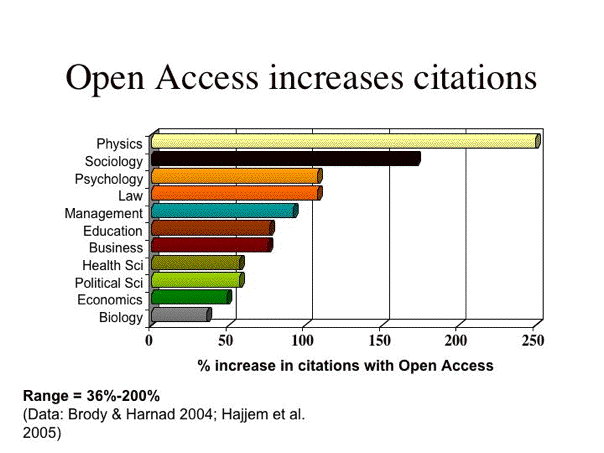
Yet still most authors'
fingers (85%) remained paralyzed. The solution again seemed obvious: The cure for Zeno's Paralysis was a
mandate from authors' institutions and funders, officially stating that it is not only OK for their employees and fundees to self-archive, but that it is
expected of them, as a crucial new part of the process of doing research and publishing their findings in the online era.
"Publish or Perish: Self-Archive to Flourish!"
The first explicit proposals to mandate self-archiving began appearing at least as early as
2000; and recommendations for
institutional and
funder Green OA self-archiving mandates were already in the Self-Archiving FAQ even before it became the
BOAI Self-Archiving FAQ in 2002, as well as in the
OSI EPrints Handbook. But as far as I know the
first officially adopted self-archiving mandate was that of the School of Electronics and Computer Science at the University of Southampton in 2002-2003.
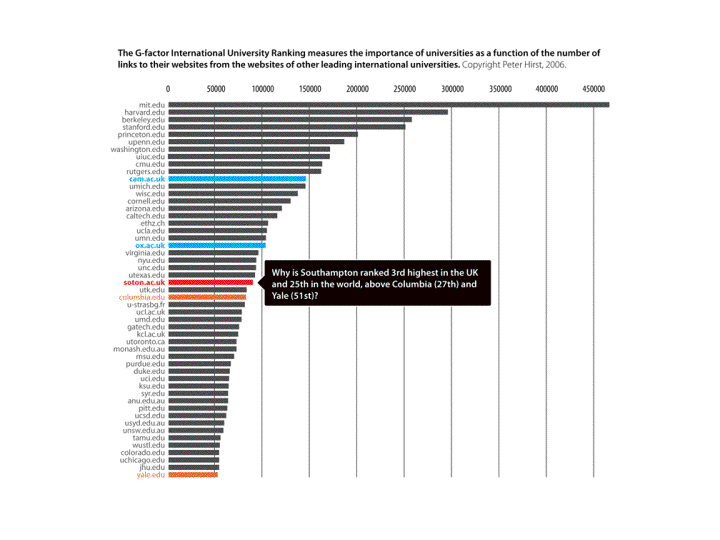
Since then, 91% of journals have already given self-archiving their official blessing:
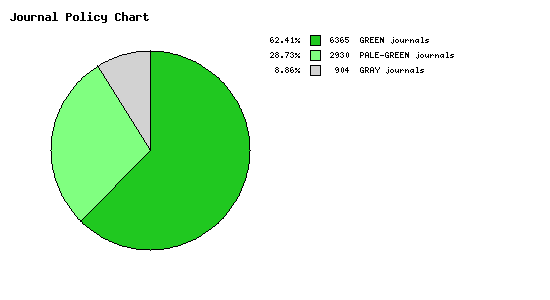
Yet
Alma Swan's
surveys of authors' attitudes toward OA and OA self-archiving mandates -- across disciplines and around the world -- have found that although authors are in favor of OA, most will not self-archive until and unless it is mandated by their universities and/or their funders. If self-archiving were mandated, however, 95% of authors state that they would comply,
over 80% of them stating they would comply willingly.
 Arthur Sale
Arthur Sale's
analyses of what authors
actually do with and without a mandate have since confirmed that if unmandated, self-archiving in
institutional repositories hovers at around 15% or lower, but with a mandate it approaches 100% within about 2 years:
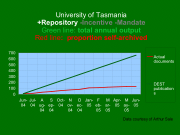
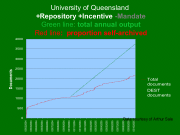
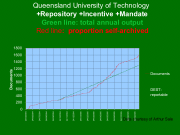 What Students Can Do to Hasten the Optimal and Inevitable but Long Overdue Outcome:
What Students Can Do to Hasten the Optimal and Inevitable but Long Overdue Outcome:
To date, 37
Green OA self-archiving mandates have been adopted worldwide, and 9 more have been proposed. Some of those mandates (such as that of
NIH in the US,
RCUK in the
UK and
ERC in Europe) have been very big ones, but most have been research funder mandates (22) rather than university mandates (12), even though virtually all research originates from universities, not all of it is funded, and universities share with their own researchers and students the benefits of showcasing and maximizing the uptake of their joint research output. Among the proposed mandates, two are very big multi-university proposals (one for all 791 universities in the 46 countries of the
European University Association and one for all the universities and research institutions of
Brazil), but those mandate proposals have yet to be adopted.
The world's universities are OA's sleeping giant. They have everything to gain from mandating OA, but they are being extremely slow to realize it and to do something about it. Unlike you students, they have not grown up in the online age, and to them the online medium's potential is not yet as transparent and natural as it is to you. You can help awaken your university's sense of its own need for OA, as well as its awareness of the benefits of OA, and the means of attaining them, by making yourselves heard:
1. OA Self-Archiving Begins At Home: First, let the professors and administration of your university know that you need and want (and expect!) research articles to be freely accessible to you on the web -- the entire research output of your own university to begin with (and not just the
fraction of its total research output that your university can afford to buy-back in the form of journal subscriptions!) -- so that you know what research is being done at your own university, whom to study with, whom to do research projects with (and even to help you select a university for undergraduate or graduate study in the first place).
2. Self-Archive Unto Others As You Would Have Them Self-Archive Unto You: Second, point out the "
Golden [or rather Green!] Rule" to the professors and administration of your university: If each university self-archives its own research output, this will not only make it possible for you, as students, to access the research output of
all other universities (and not just the
fraction of the total research output of other universities that your own university can afford to buy-in in the form of journal subscriptions!), so that you can use any of it in your own studies and research projects. Far more important, it will also make it possible for
all researchers, at all universities (including your own), to access
all research findings, and use and apply them in their own research and teaching, thereby maximizing research productivity and progress for the entire university community worldwide -- as well as for the tax-paying public that funds it all, the ones for whose benefit the research is being conducted.
But please make sure you get the rationale and priorities straight! The (successful) lobbying for the NIH self-archiving mandate was based in part on a premise that may have gone over well with politicians, and perhaps even with voters, but if thought through, it would not be able to stand up to
close scrutiny. The slogan had been: We need to have OA so that taxpayers can have access to health research findings that they themselves paid for. True. And sounds good. But how many of the annual 2.5 million peer-reviewed research journal articles published every year in the 25,000 journals across all disciplines does that really apply to? How many of those specialized articles are taxpaying citizens likely ever to want (or even be able) to read! Most of them are not even relevant or comprehensible to undergraduate students.
Peer-To-Peer Access
So the overarching rationale for OA cannot be
public access (though of course public access comes with the territory). It has to be
peer-to-peer access. The peers are the research specialists worldwide for whom most of the peer-reviewed literature is written. Graduate students are entering this peer community; undergraduates are on the boundaries of it. But the general tax-paying public has next to no interest in it at all.
By the very same token, you will not be able to persuade your professors and administration that OA to the peer-reviewed research literature needs to be mandated because students have a burning need and desire to read it all! Students benefit from OA, but that cannot be the primary rationale for OA. Peer-to-peer (i.e., researcher to researcher) access is what has to be stressed. It is researchers worldwide who are today being denied access to the research findings they need in order to advance their research for the benefit of us all -- for the benefit of present and future students for whom the findings will be digested and integrated in textbooks, and for the benefit of the general public for whom the findings will be applied in the form of technological advances and medicines for illnesses.
So it is
daily, weekly, monthly research impact that is needlessly being lost, cumulatively, while we keep dragging our feet about providing OA. That's what you need to stress to your professors and administration: all those findings that could not be used and applied and built upon because they could not be accessed by all or even most of their potential users, because it simply costs too much to subscribe to all or most of the journals in which they were published.
Updating the Academic Mandate for the Online Era
Point out also that OA policies always fail if they are merely recommendations or requests. The only thing that will embolden and motivate all researchers to self-archive is self-archiving mandates. "Mandate" is not a bad word. It doesn't mean "coercion" or punishment. It's all carrots, not sticks. Professors have a mandate to teach, and test, and give marks. They also have a mandate to do research, and publish (or perish!). If they teach well and do good research, they earn promotions, salary increases, tenure, research funding, prizes. If they don't fulfill their mandate, they don't. It's the same with students: You have a mandate to study and acquire knowledge and skills. If you don't fulfill your mandate, you don't earn good marks.
Mandates and Metrics
So it is not so much a matter of adopting a new "Green OA self-archiving mandate" for faculty, but of adapting the existing mandate. OA self-archiving is a natural adaptation to the
PostGutenberg Galaxy and its technical potential (just as we adapted to reading and writing, printing, libraries and photocopying). It is no longer enough to just do, write up, and publish research: It has to be self-archived too. And the carrots are already there to reward doing it: Faculty are already evaluated on how well they fulfill their research performance mandate not only by counting their publications, but by assessing their impact -- for which one of the most important
metrics is how much it is taken up, used and cited by further research. And citation counts are among the things that OA has been shown to increase.
It's rather as if -- as a part of your mandate as students -- you now had to submit your work online (as most of you already do!) instead of on paper in order to be evaluated and graded. Except it's even better than that for faculty, because self-archiving their work will actually
increase their "grades."
In short, it's a win/win/win situation for your university, for your professors and for you, the students -- if only your university gets round, at long last, to fast-forwarding us to the optimal and inevitable: by
mandating Green OA self-archiving. Rather than be puzzled and impatient that they have not done it already, you should provide a strong show of support for their doing it now. Be ready with the answers to the inevitable questions about
how and why (and when and where). And beware, the
34-headed monster of "Zeno's Paralysis" is still at large, and growing back each head the minute you lop one off...
Stevan Harnad
American Scientist Open Access Forum










